BAIKIDA
CARROLL
is a highly pivotal figure in the music world as both a composer and trumpeter. He has written scores that have distinguished theater, dance, television, film, and concerts for over four decades. His music and trumpet have been heard at major forums throughout the world including The Booth Theatre (NYC), Merkin Hall (NYC), Carnegie Hall, The Kennedy Center, the Walker Art Center, The New York and Washington D.C. Shakespeare Festival, the McCarter Theatre, the Chicago Museum of Art, The Mark Taper Forum, Le Grande Palais (Paris), the Belgium Opera,
the Berlin Opera, the Market
Theater (Johannesburg, South Africa),
as well as a multitude of jazz festivals including North Sea, JVC,
Heritage, Montreux, Kool, Vision, and Newport. |

St
Louis 1948 |
Born January 15,1947 in St. Louis, Missouri, the son of tenor saxophonist Jimmy Harris, (who played locally with Edgar Bateman). While attending Vashon High School, Baikida was encouraged to play cornet by band director O'hara Spearman. By the end of the year Carroll was in the Senior band (that also included Donny Hathaway, and Raiford Hicks) He was later introduced to the trumpet by Vernon Nashville the following year after his transfer to Soldan High. Carroll immediately excelled on the trumpet and found himself not only performing with the marching band and concert orchestra, but also a weekend All City Jazz Ensemble organized and directed by Vernon Nashville. The Jazz Ensemble rehearsed at the now defunct Black Musicians Union Hall. Charts were donated by Oliver Nelson and other local professionals, who would also stop by and watch the youngsters play. This band included Lester Bowie, J.D. Parran, and James "Jabbo" Ware. It was in this rehearsal setting while playing 3rd and 4th trumpet Lester Bowie turned to young Carroll and asked would he like to play a gig with him and his wife Fontella Bass. This was Baikida's first professional job. During Baikida's 17th and 18th year, he also performed with Oliver Sain, Little Milton, and Albert King. He continued studying trumpet and theory privately with his mentor Vernon Nashville. |
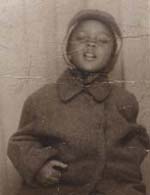 St
Louis 1951
St
Louis 1951 |
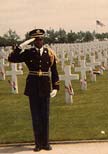
Netherlands
1966 |
In 1965, Baikida enlisted in the Army where he excelled and was awarded music composition honors while attending the Armed Forces School of Music, Norfolk, Virginia. Assigned to the 3rd Armored Division band, Frankfurt, Germany, and later 3rd Infantry Division Band, Wurzburg, Germany he found himself performing everything from classical concerts and parade music to situation bugle calls, and Beer Festivals. It was during his military service that Baikida became enthralled with improvisational music, the impetus being an after hours (usually impromptu) jam session that he later wrote charts for. This corresponded with his recent discovery of the music of Don Cherry, John Coltrane, Cecil Taylor, John Cage, Eric Dolphy, Frank Zappa, and Ornette Colman. |
In 1968, Baikida returned to St. Louis and performed a few gigs with several bands that he had played with prior to the army including, Ike and Tina Turner (directly before the Las Vegas period) and Oliver Sain. However, after his revelations with the Avant Gard, he realized his direction was toward a more improvisational form of music.
That same year while practicing in the park, he was approached by Julius Hemphill, and invited to join the newly formed Black Artist Group (BAG), an inter-arts cooperative, dedicated to the development of creative and experimental artist, members included Julius Hemphill, Oliver Lake, J.D. Parran and John Hicks. Although, eventually he became the orchestra conductor as well as composition and trumpet instructor, initially he performed as an actor in "It Happened On The Way Here" by Vincent Terrell with the TSOCC Players. In 1971, he composed and conducted the music for the full-scale company production of "Poem for A Revolutionary Night" by Larry Neal. He also attended Southern Illinois University, and took summer master classes in music at Washington University under the direction of Oliver Nelson, with guest instructors such as Thad Jones, Ron Carter, Mel Lewis, Phil Woods, and Roland Hanna between 1968 and 1972.
|

Fontella
Bass, Carroll
1971
|
In 1971, Baikida was commissioned to score his first industrial film, "Billy
Goes to Mecca," by The Metropolitan
Community Center for the Arts. He also recorded Oliver
Lake's first album "NTU, The Point from Which Creation Begins". The following year, Baikida teamed with Julius Hemphill, to record Julius's debut album "Dogon A.D". Later that year, Baikida,
Oliver Lake, Joseph Bowie, Floyd Leflore and Charles "Bobo" Shaw ventured to Paris, France, to seek broader performing opportunities. One of their first concerts was at the Grande Palais. The ensemble performed throughout Europe for a year, and after its conclusion, Oliver and Baikida continued performing as a duo for an additional year.

Bobo,
Joe, Baikida, Floyd and Oliver in Paris 1973 |
 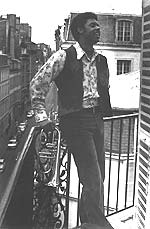
Paris 1974
|
In 1973, Baikida formed his own ensemble and worked around Paris. He also taught trumpet and music theory at the American Center for Students and Artists, and performed with Steve Lacy, Dr. John, Anthony Braxton, Johnny Dyani, Alan Silva and several other musicians throughout Europe. 1974 Baikida was awarded his first residency fellowship, by the International Cite des Arts, Paris. The following year Baikida recorded his first album "Orange Fish Tears", with Oliver Lake, Nana Vasconcelos, and Manual Villaroel, on the Palm Record label.
June 1975 saw Baikida's return to New York City, where he was reunited and performed with friends such as: Julius Hemphill, Sam Rivers, Hamiet Bluiett, Oliver Lake, Lester Bowie, and David Murray. He taught composition and directed the big band at Queens College, and was a first-call trumpet player for several producers, including Michael Cuscuna and Charlie Morrow. In 1976, he traveled to San Francisco for a weekend gig at the Keystone Korner with Oliver Lake and stayed for 2 1/2 years. He performed locally and led bands that included members such as Julian Preister, Alex Cline, Michael Formanek, Don Moye, Michele Rosewoman, and John Carter. In 1978, Baikida returned to New York City and performed with his band, "Ring" which was comprised of Billy Hart, Julius Hemphill, Fred Hopkins, Michele Rosewoman, Nana Vasconcelos, Abdul Wadud. He also played concerts with Howard Johnson, Jay McShann, Leo "Wadada" Smith, George Gruntz, Roscoe Mitchell, Don Pullen, and others. Later that year, he relocated to Woodstock, NY, and became part of the faculty and artistic advisory board (along with Dave Holland and Jack DeJohnette) of Woodstock's legendary Creative Music Studio, where he also taught until 1984. He resided in Woodstock with his family for 28 years.
|
The year 1978 brought a fortuitous opportunity. After performing with his band at the New York Public Theater, he was approached by Joseph Papp who was in the audience of his "Ring" concert. Mr. Papp asked him if he was interested in writing music for theater. Baikida responded enthusiastically. This initial meeting led to a long-term friendship and creative association with Joe Papp. Baikida's first commission was to score the music for "White Sirens", a play by Lois Elaine Griffith and later "The Mighty Gents" by Richard Wesley. This event rekindled a passion of writing for theater, which had been initiated in the Black Artists Group of 1968, and continues to this day.
Carroll has organized and lead dazzling music ensembles since the early 70's including: Ring, The Baikida Carroll Quintet, Bush Wish, The Baikida Carroll Quartet, Imagine This, The Carroll Ensemble, and Baikida Instant. A few of the band members were: Anthony Davis, Julian Preister, Michael Formanek, Reggie Workman, John Carter, Ed Blackwell, Santi Debriano, Erica Lindsay, Ade Steve Colson, J.D Parran, Famoudou Don Moye, Dave Holland, Phillip Wilson, Johnny Dyani, David Sancious, Pheeroan akLaff, Marty Ehrlich, Geri Allen, Mark Helias, Marilyn Crispell, and Freddie Waits
|

Baikida and daughter Jade 1981
|
Baikida recorded Door of the Cage in 1995, on Soul Note Records. The critically acclaimed recording received kudos as Record of the Month, Pick of the Week, and one of the Top Ten of the Year from several publications. On September 14th and 15th 2000, he recorded "Marionettes on a High Wire" for Omni Tone Records. This album was also lauded as one of the best of the year and received a plethora of raving reviews.
Since the 80's Carroll performed as side man with some of the top bands in the business, including The American Quartet (Charlie Haden, Dewey Redman, Paul Motian and Carroll) Jack DeJohnette's Special Edition, Don Cherry, Meredith Monk, Oliver Lake and Julius Hemphill Big Bands, Muhal Richard Abram's Big Band and Quartet, Charlie Haden's Liberation Orchestra, David Murray's Octet and Big Band. In 1998, Baikida completed a European tour as a featured soloist with the Carla Bley orchestra, performing her classic jazz opera Escalator Over the Hill. He performed live in New York City and recorded the 2000 Grammy nominated CD "Inspiration" with jazz innovator Sam Rivers in the Sam Rivers All Star Big Band, an ensemble organized to honor Rivers 75th birthday.
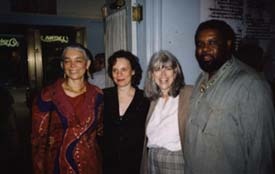
Camille
Cosby, Emily Mann, Judith James, Baikida
Broadway Opening Night , " Having Our Say"
New York 1995
|
Carroll's theater compositions include: Uncle Vanya by Anton Chekov, The Mighty Gents by Richard Wesley (featuring Denzel Washington and Samuel L. Jackson), Poem for a Revolutionary Night by Larry Neal, Coontown Bicentennial Memorial Services with and by Julius Hemphill, For Colored Girls who have Considered Suicide when the Rainbow is Enuf by Ntozake Shange, featuring the voice of Patti LaBelle, Miss Julie by August Strindberg, Safe As Houses by Richard Greenberg, Legacies by Kermit Frazier, Cat On A Hot Tin Roof by Tennessee Williams, King Lear by William Shakespeare, A Doll House by Henrik Ibsen, and The House of Bernarda Alba by Federico Garcia Lorca. In addition, Baikida co-authored and scored the highly acclaimed R&B musical Betsey Brown with Ntozake Shange and Emily Mann. In 1995, Baikida composed the score to Emily Mann's celebrated; Tony-nominated Broadway hit show, Having Our Say. In September 2003, The Athens Festival invited the Washington, DC Shakespeare Festival to present Michael Kahn's adaptation of Sophocles' epic trilogy; The Oedipus Plays (Oedipus the King, Oedipus at Colonus and Antigone). Baikida Carroll scored this monumental theatrical undertaking. The Athens Festival - the most important event in Greece - attracts thousands of international visitors each year for performances of classical music, opera, plays, and dance. Participants have included the New York Philharmonic with Leonard Bernstein, the Kirov and Bolshoi Ballets, the American Ballet Theatre, the Royal National Theatre of England, and performers such as Maria Callas, Rudolf Nureyev, Margo Fonteyn, Martha Graham, and Luciano Pavarotti. The Oedipus Plays was performed in the Roman Odeon of Herod Atticus, on the south slope of the Acropolis in the shadow of the Parthenon.
|
Throughout his career, Baikida has received a number of fellowships, awards, grants, residencies, and commissions. These include: the National Endowment for the Arts (1980 and 1983), Meet the Composer (1981,1982, and 1993), the Musicians' Foundation (1986 and 1987), and the Southern Illinois University Board of Trustees Academic Scholarship Award (1971). He was awarded Residency Fellowships at Music OMI (1997), the American Center for Students and Artists in Paris, France (1973-75), and the International Cite des Arts in Paris (1974-75). Baikida also received the "Duke Ellington Established Composers Award" commissioned by the American Society of Composers, Authors and Publishers (ASCAP) and the International Association of Jazz Educators. For this occasion, he composed and conducted "Chez Duke", performed by the United States Air force Big Band "Airmen of Note", premiering in New Orleans, Jan. 13, 2000. In 2002 Chamber Music America awarded Baikida a commission to write "In Tango Roots", a suite of 12 Tangos for a 9 piece ensemble. He received the 2010 New York State Council for the Arts/FONT Artist Commission award. For this occasion, he wrote "Requiem for the Dark Horse", a 70-minute suite for three trumpet improvisers and chamber ensemble. The Requiem is dedicated to Lester Bowie, Julius Hemphill, Don Cherry, and John Hicks and includes recorded vocal comments and projected still images of the four departed master improvisers.
Baikida has also served as a Planning Board member for the Pew Charitable Trust Foundation (1992), a panelist for the New York State Council on the Arts Artists' Fellowships (1989), the Colored Museum Symposium on Multi-Ethnic Theater (1994), and The Mid-Atlantic Arts Foundation (2007-2008). He currently serves on the board of Music OMI.
|
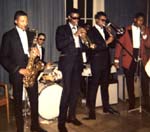 The
Lee Cross Band
The
Lee Cross Band
Frankfort Germany 1966 |
 
Ade,
Baikida, Michael, Erica, Pheeroan
The Baikida Carroll Quintet
Braga,
Portugal
March 16, 2002
The mysteries of music are not for the feint of heart, but can inspire indescribable bliss.
-Baikida Carroll |
to top of page
|